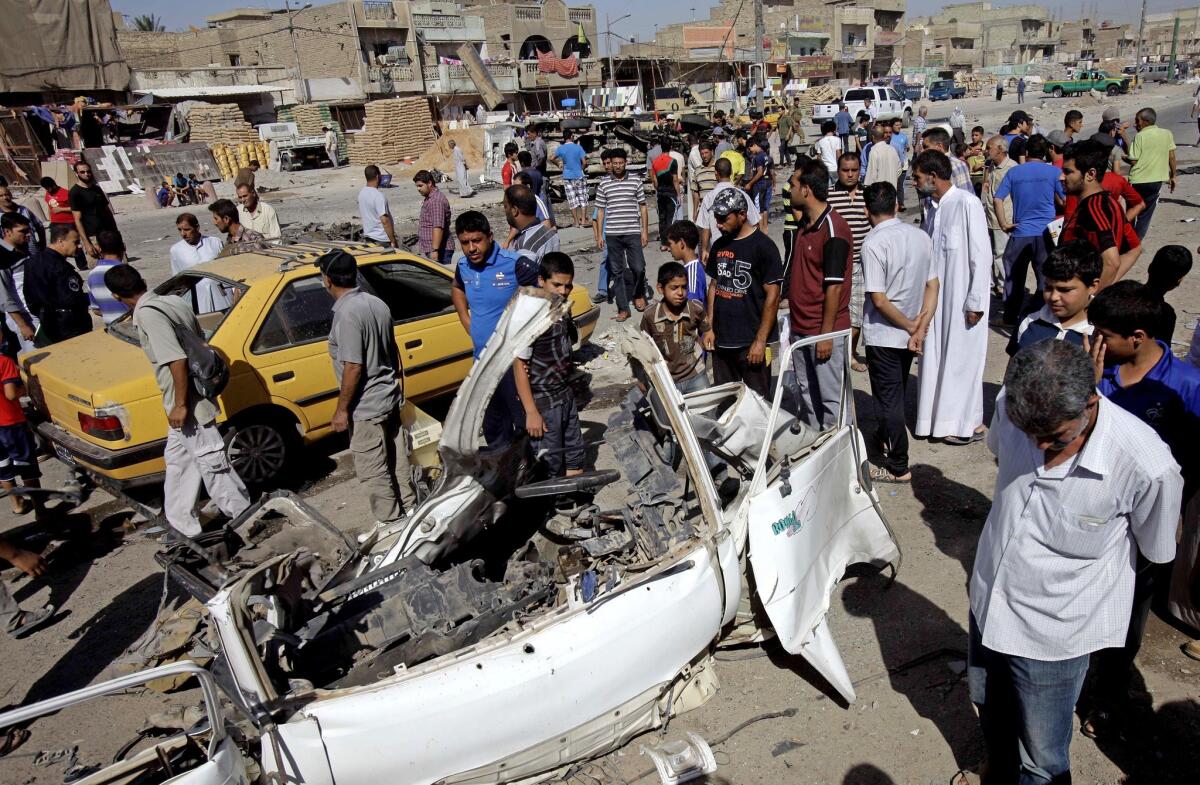U.N.: 1,000 killed in Iraq in July, highest monthly toll in 5 years

- Share via
BAGHDAD — More than 1,000 people were killed in Iraq in July, the highest monthly death toll in five years, the United Nations said Thursday, a grim figure that shows the rapidly deteriorating security as sectarian tensions soar nearly two years after U.S. troops withdrew from the country.
Violence has been on the rise all year, but the number of attacks against civilians and security forces has spiked during the Islamic holy month of Ramadan, which began early last month. The increased bloodshed has intensified fears that Iraq is on a path back to the widespread chaos that nearly tore the country apart in the aftermath of the U.S.-led invasion that ousted Saddam Hussein in 2003.
There have been months of rallies by Iraq’s minority Sunnis against the Shiite-led government over what they contend is second-class treatment and the unfair use of tough anti-terrorism measures against their sect.
The killings significantly picked up after Iraqi security forces launched a heavy-handed crackdown on a Sunni protest camp in the northern town of Hawija on April 23. A ferocious backlash followed the raid, with deadly bomb attacks and sporadic gun battles between insurgents and soldiers — this time members of the Iraqi security forces rather than U.S. troops.
The U.N. Mission in Iraq said 1,057 Iraqis were killed and 2,326 wounded in July, the highest toll since June 2008 when 975 people were killed.
The increase was particularly troubling because the numbers had begun declining five years ago following a series of U.S.-led offensives and a Sunni revolt against Al Qaeda in Iraq.
“We haven’t seen such numbers in more than five years, when the blind rage of sectarian strife that inflicted such deep wounds upon this country was finally abating,” acting U.N. envoy to Iraq Gyorgy Busztin said in a statement. “I reiterate my urgent call on Iraq’s political leaders to take immediate and decisive action to stop the senseless bloodshed, and to prevent these dark days from returning.”
The U.N. said that 928 of those killed in July were civilians and 129 were Iraqi security forces.
In all, 4,137 civilians have been killed, mostly in Baghdad, and 9,865 wounded so far this year, according to the statement. That was up from 1,684 killed in the January-July period last year.
Al Qaeda in Iraq has claimed responsibility for many of the suicide attacks and car bombings in recent days as it sought to stoke sectarian hatred and undermine Iraq’s Shiite-led government. Much of the violence is targeting Shiites who have held the reins of power since Saddam’s Sunni-dominated regime was ousted.
U.N. Secretary-General Ban Ki-moon last month described the scale of violence as alarming, and warned that the increasingly sectarian-charged civil war raging in neighboring Syria is affecting Iraq’s own political stability.
Although Iraq is officially neutral in the conflict, U.S. officials charge that it continues to allow flights suspected of carrying Iranian arms to transit its airspace. Iraqi officials have carried out some spot checks of Iranian planes and say they’ve found nothing.
Iraqi fighters are meanwhile traveling to fight in Syria, with Shiites fighting alongside President Bashar Assad’s forces and Iraq’s Al Qaeda arm, now known as the Islamic State of Iraq and the Levant, siding with the mostly Sunni rebels.
“Iraq has become part of the ongoing regional struggle between regional powers such as Iran, Saudi Arabia and Turkey,” Baghdad-based political analyst Hadi Jalo said. “The growing power of Al Qaeda-linked extremist groups in Syria is having a devastating impact on the Iraqi situation. Now, the Islamic fighters have much more freedom to move across the Iraqi-Syrian borders in order to launch attacks in both countries.“
ALSO:
U.S., Pakistan agree to revive high-level talks
Uruguay takes key step toward legalizing marijuana
Edward Snowden granted asylum, leaves Moscow airport in taxi
More to Read
Sign up for Essential California
The most important California stories and recommendations in your inbox every morning.
You may occasionally receive promotional content from the Los Angeles Times.










